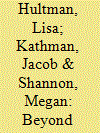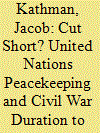| Srl | Item |
| 1 |
ID:
135954


|
|
|
|
|
| Summary/Abstract |
While United Nations peacekeeping missions were created to keep peace and perform post-conflict activities, since the end of the Cold War peacekeepers are more often deployed to active conflicts. Yet, we know little about their ability to manage ongoing violence. This article provides the first broad empirical examination of UN peacekeeping effectiveness in reducing battlefield violence in civil wars. We analyze how the number of UN peacekeeping personnel deployed influences the amount of battlefield deaths in all civil wars in Africa from 1992 to 2011. The analyses show that increasing numbers of armed military troops are associated with reduced battlefield deaths, while police and observers are not. Considering that the UN is often criticized for ineffectiveness, these results have important implications: if appropriately composed, UN peacekeeping missions reduce violent conflict.
|
|
|
|
|
|
|
|
|
|
|
|
|
|
|
|
| 2 |
ID:
167377


|
|
|
|
|
| Summary/Abstract |
While much literature on peacekeeping seeks to determine the effect of United Nations (UN) intervention on post-conflict peace processes, most peacekeeping operations (PKOs) are deployed to active conflicts. The limited research on peacekeeping in active civil conflicts suggests that robust PKOs reduce hostilities. Yet, if PKOs serve to extend conflict duration, even lowered hostilities can yield greater destruction over time. We thus explore the effect of peacekeeping on conflict duration. We argue that PKOs with larger troop deployments are better able to increase the cost of combat, improve information sharing between belligerents, and provide security guarantees, thus reducing the time to negotiated resolutions. Using fine-grained data on monthly peacekeeping personnel commitments and observations of ongoing conflict between combatants, we examine how variations in mission deployments affect the success of UN peacekeeping in ending civil conflicts. As expected, our findings indicate that larger troop deployments shorten war duration to negotiated resolution.
|
|
|
|
|
|
|
|
|
|
|
|
|
|
|
|